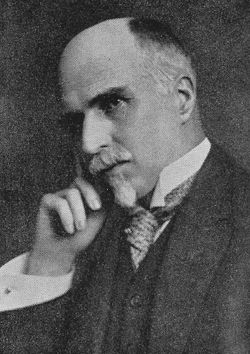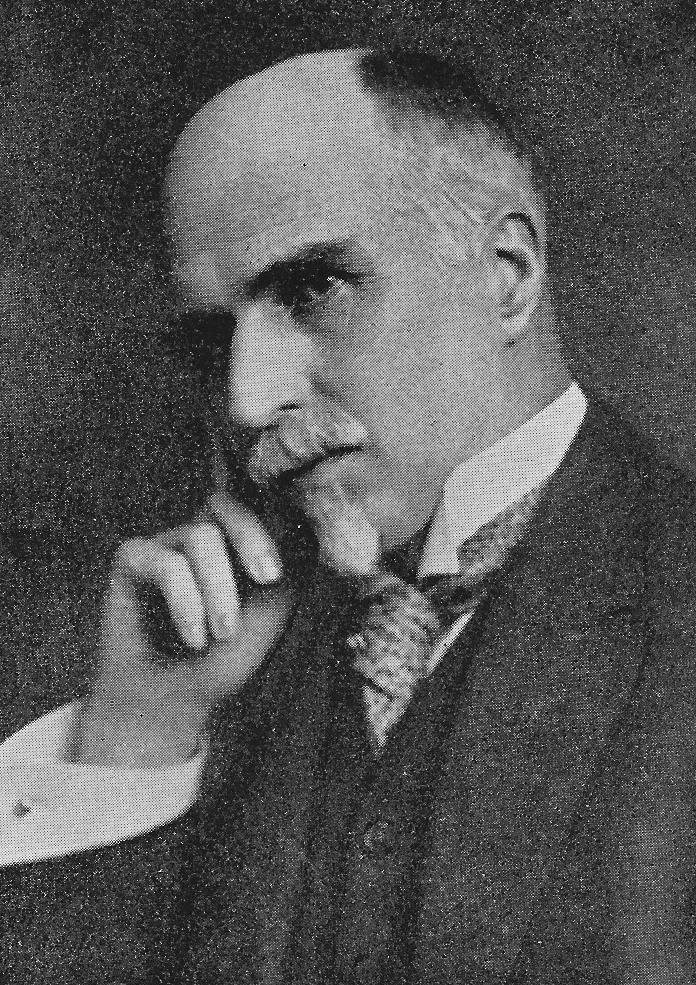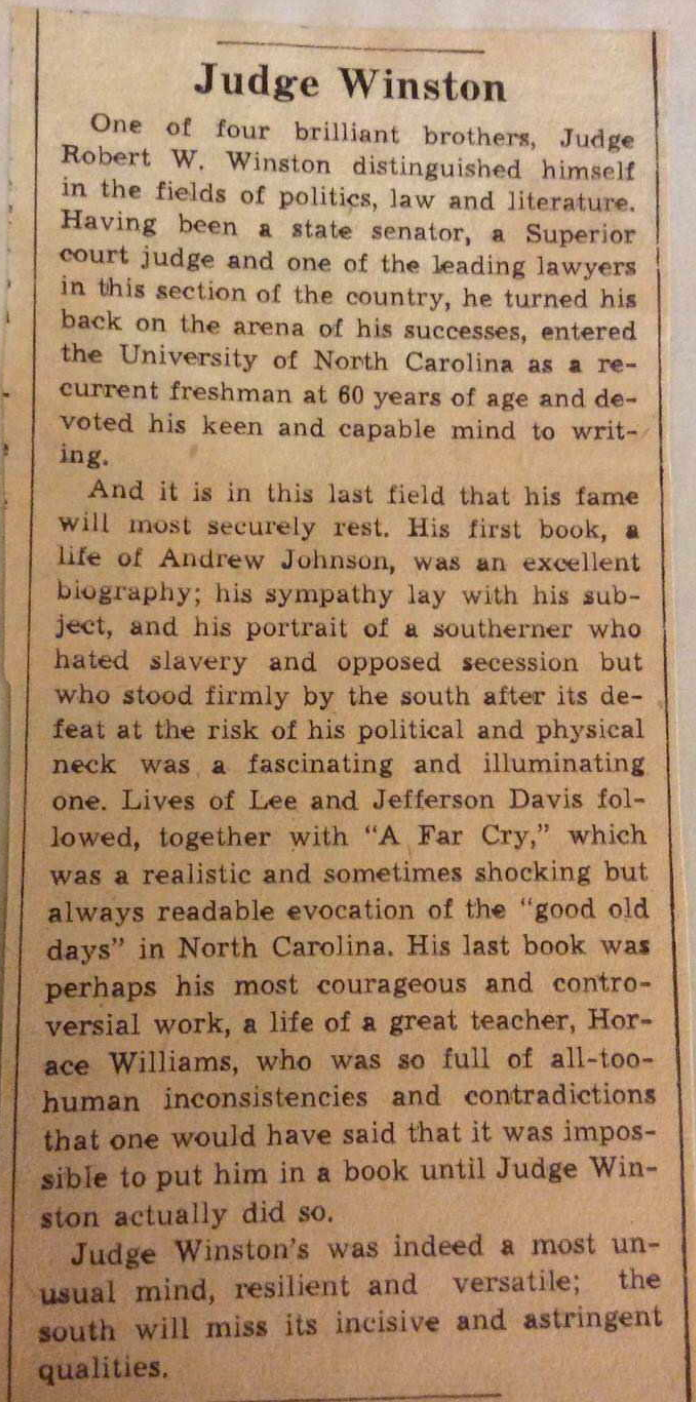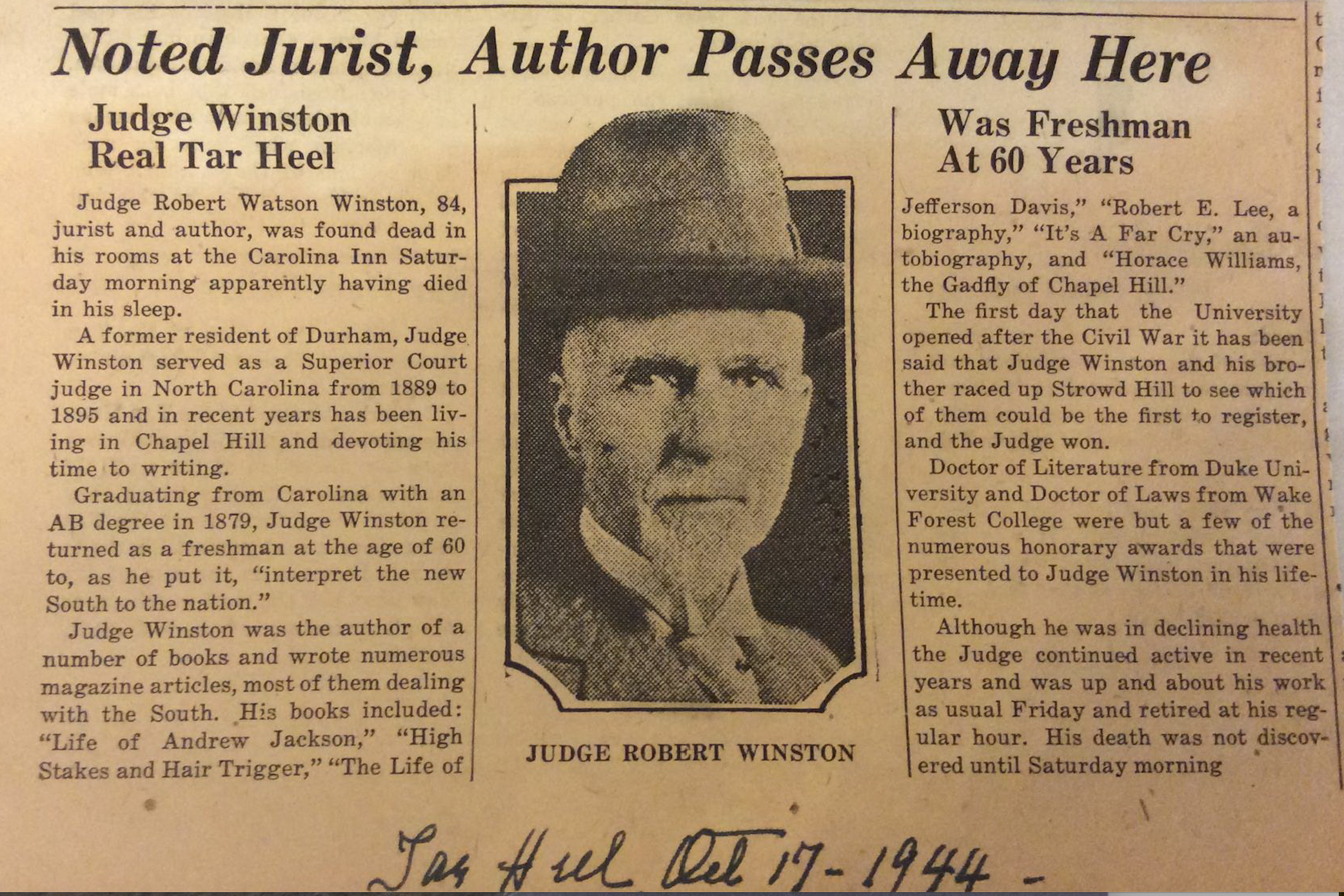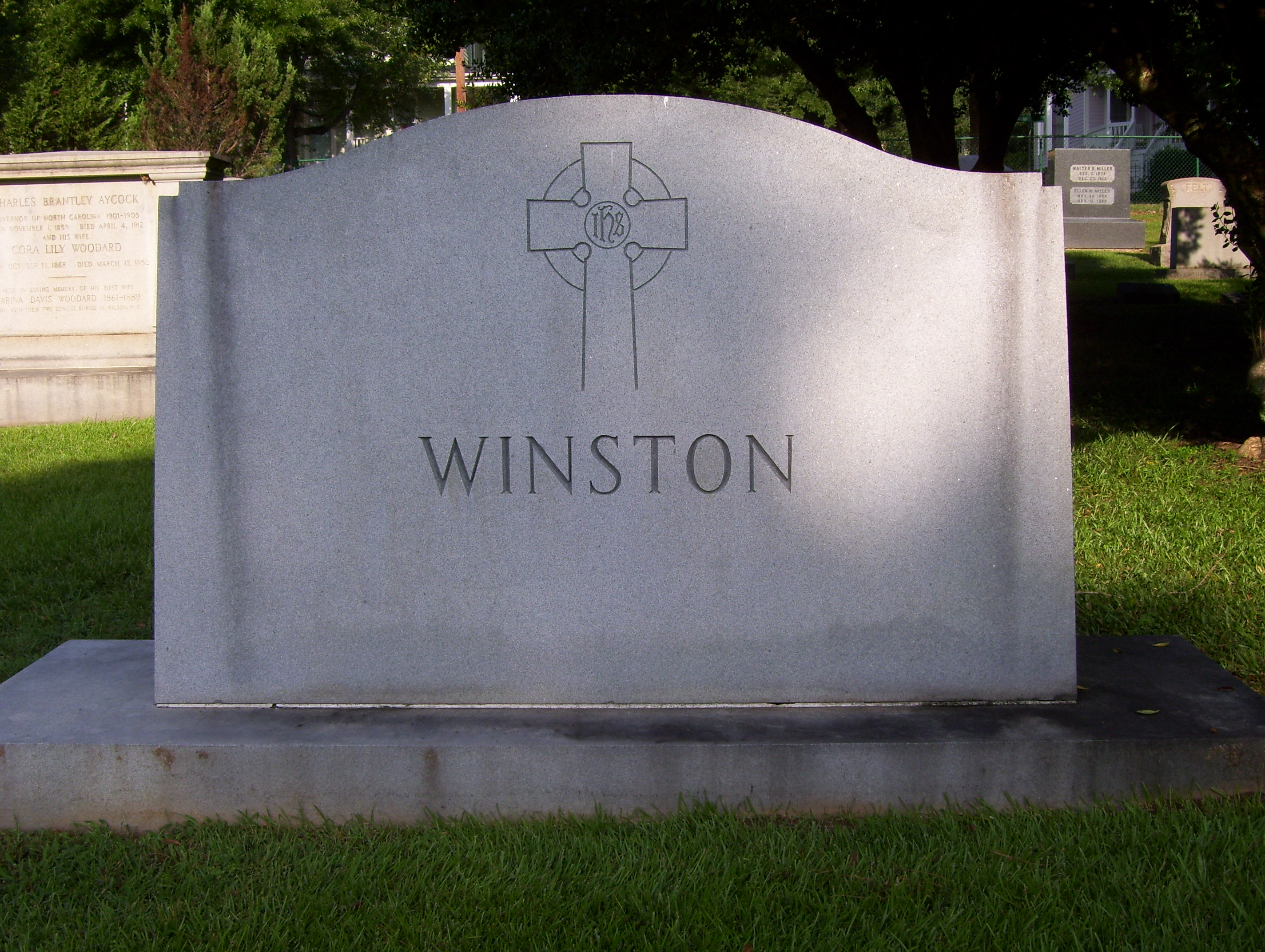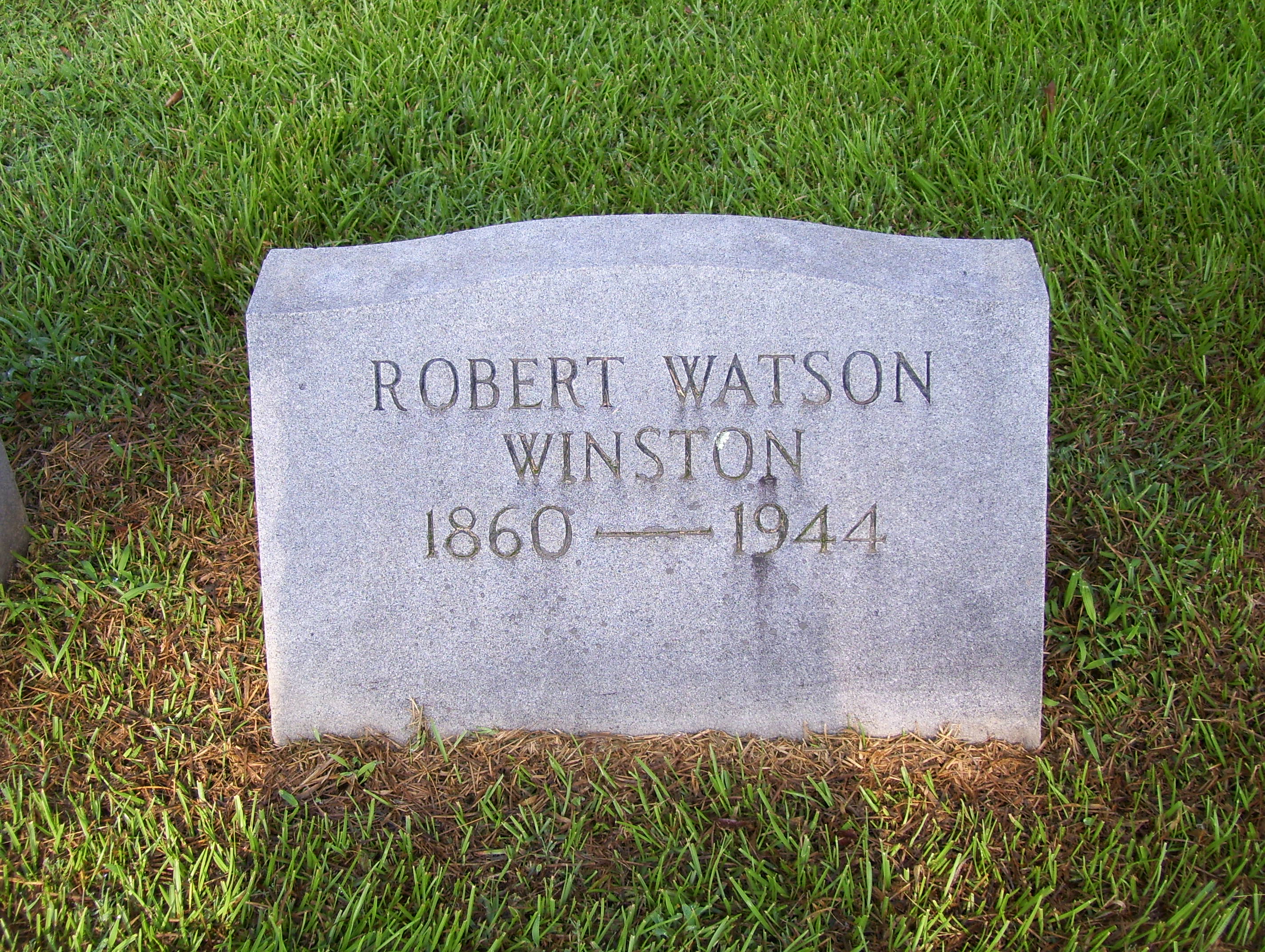At the age of eleven he went to Oxford, North Carolina, to attend the classical school of James Hunter Horner, whose daughter Sophronia he later married on 13 December 1882 in Oxford.
He enrolled with his brother Francis at the University of North Carolina in September 1875. After receiving his B.A. degree there in 1879, he taught at the Horner School for a year and then r e t u r n e d to Chapel Hill to study law, obtaining his LL.B. degree in 1881. While an undergraduate, he had been awarded the Willie P. Mangum Medal for oratory, the highest honor given by the University.
He first practiced law in Oxford, also serving as city treasurer and city attorney. In 1884 he became a member of the Democratic State Committee, and in November of that year was elected to the state Senate from Granville County, serving from 1885-1887.In 1889 he was appointed a circuit judge of the Superior Court of North Carolina, serving until he resigned in January 1895 to resume his law practice. He settled in Durham and established one of the state's most prominent law firms.
He was president of the Durham Chamber of Commerce in 1896, president of the North Carolina Literary and Historical Association in 1897, and very active in other Durham civic affairs. As a popular public speaker, he delivered numerous addresses on law, history and patriotic topics, and some of his lectures were published. He also wrote newspaper and magazine articles.
In 1909 he moved to Raleigh where he practiced law, first in association with former Governor Charles B. Aycock, and later with his son Robert Watson Winston, Jr. During World War I he was chairman of the American Red Cross for Wake County. In the early 1920s, while semi-retired, he lived for a while at the Cosmos Club in Washington, D.C., before returning to North Carolina.
When he finally retired in 1924, he enrolled at the University of North Carolina at Chapel Hill as a sixty-three-year-old freshman, and studied philosophy and related subjects for several years. He continued to devote much of his time to writing, contributing historical essays to scholarly journals and publishing numerous magazine and news articles on public affairs.
Although Winston had an outstanding legal, judicial and political career for over forty years, he now achieved his greatest prominence, and national acclaim, as a best-selling biographer of famous Southerners and as an interpreter and spokesman for the Old and the New South. He authored five books.
In 1928 his well-known Andrew Johnson: Plebian and Patriot appeared, followed by High Stakes and Hair Trigger: The Life of Jefferson Davis (1930), and Robert E. Lee: A Biography (1934).
His autobiography, It's A Far Cry, was published in 1937. Although much of the book is concerned with Southern traditions, politics, economics and the racial issue, his sketches of parents, siblings, kinfolk, ancestors, Windsor, and childhood make it still today an invaluable tool for any Winston researching descent from Patrick Henry Winston and Martha Elizabeth Bird.
His last book, Gadfly of Chapel Hill: A Biography of Horace Williams, Socrates of Chapel Hill, treating the well-known North Carolina professor and philosopher, appeared in 1942. Winston's Journal and Scrap Book was published in four volumes in the years between 1932 and 1944. In these he recorded his reactions to and analyses of public events, national and international, from World War 1 to World War II.
When he was not writing about the South, Winston was in great demand as a public speaker about the South. He addressed the North Carolina Bar Association in 1934 on "A Garland for Ashes," outlining a program of progress for the South, and was the centennial orator on the 100th anniversary of the state Supreme Court in 1920.
Wake Forest College (1915), the University of North Carolina (1929), and He was also Duke University (1937) all awarded him honorary doctoral degrees. He was also elected an honorary member of Phi Beta Kappa in 1939 by the University of North Carolina.
Robert Watson Winston died at the Carolina Inn, Chapel Hill on 14 October 1944 and was buried in Raleigh. He left a great legacy to historians and especially to Winston family genealogists. His papers (3,000 items, including nine volumes) were deposited in the Southern Historical Collection, University of North Carolina Library, Chapel Hill. The collection includes: family, political and professional correspondence; notes and source materials for his books; many uncounted clippings; and manuscript articles on historical, political, sectional, racial, religious, educational and economic questions."
Written by his great grandniece, Patricia Winston Norman (1942 – 2012)
And used in the book, Winston's of North Carolina and their Descendants by Joseph S. Rowland, Jr. (1982)
At the age of eleven he went to Oxford, North Carolina, to attend the classical school of James Hunter Horner, whose daughter Sophronia he later married on 13 December 1882 in Oxford.
He enrolled with his brother Francis at the University of North Carolina in September 1875. After receiving his B.A. degree there in 1879, he taught at the Horner School for a year and then r e t u r n e d to Chapel Hill to study law, obtaining his LL.B. degree in 1881. While an undergraduate, he had been awarded the Willie P. Mangum Medal for oratory, the highest honor given by the University.
He first practiced law in Oxford, also serving as city treasurer and city attorney. In 1884 he became a member of the Democratic State Committee, and in November of that year was elected to the state Senate from Granville County, serving from 1885-1887.In 1889 he was appointed a circuit judge of the Superior Court of North Carolina, serving until he resigned in January 1895 to resume his law practice. He settled in Durham and established one of the state's most prominent law firms.
He was president of the Durham Chamber of Commerce in 1896, president of the North Carolina Literary and Historical Association in 1897, and very active in other Durham civic affairs. As a popular public speaker, he delivered numerous addresses on law, history and patriotic topics, and some of his lectures were published. He also wrote newspaper and magazine articles.
In 1909 he moved to Raleigh where he practiced law, first in association with former Governor Charles B. Aycock, and later with his son Robert Watson Winston, Jr. During World War I he was chairman of the American Red Cross for Wake County. In the early 1920s, while semi-retired, he lived for a while at the Cosmos Club in Washington, D.C., before returning to North Carolina.
When he finally retired in 1924, he enrolled at the University of North Carolina at Chapel Hill as a sixty-three-year-old freshman, and studied philosophy and related subjects for several years. He continued to devote much of his time to writing, contributing historical essays to scholarly journals and publishing numerous magazine and news articles on public affairs.
Although Winston had an outstanding legal, judicial and political career for over forty years, he now achieved his greatest prominence, and national acclaim, as a best-selling biographer of famous Southerners and as an interpreter and spokesman for the Old and the New South. He authored five books.
In 1928 his well-known Andrew Johnson: Plebian and Patriot appeared, followed by High Stakes and Hair Trigger: The Life of Jefferson Davis (1930), and Robert E. Lee: A Biography (1934).
His autobiography, It's A Far Cry, was published in 1937. Although much of the book is concerned with Southern traditions, politics, economics and the racial issue, his sketches of parents, siblings, kinfolk, ancestors, Windsor, and childhood make it still today an invaluable tool for any Winston researching descent from Patrick Henry Winston and Martha Elizabeth Bird.
His last book, Gadfly of Chapel Hill: A Biography of Horace Williams, Socrates of Chapel Hill, treating the well-known North Carolina professor and philosopher, appeared in 1942. Winston's Journal and Scrap Book was published in four volumes in the years between 1932 and 1944. In these he recorded his reactions to and analyses of public events, national and international, from World War 1 to World War II.
When he was not writing about the South, Winston was in great demand as a public speaker about the South. He addressed the North Carolina Bar Association in 1934 on "A Garland for Ashes," outlining a program of progress for the South, and was the centennial orator on the 100th anniversary of the state Supreme Court in 1920.
Wake Forest College (1915), the University of North Carolina (1929), and He was also Duke University (1937) all awarded him honorary doctoral degrees. He was also elected an honorary member of Phi Beta Kappa in 1939 by the University of North Carolina.
Robert Watson Winston died at the Carolina Inn, Chapel Hill on 14 October 1944 and was buried in Raleigh. He left a great legacy to historians and especially to Winston family genealogists. His papers (3,000 items, including nine volumes) were deposited in the Southern Historical Collection, University of North Carolina Library, Chapel Hill. The collection includes: family, political and professional correspondence; notes and source materials for his books; many uncounted clippings; and manuscript articles on historical, political, sectional, racial, religious, educational and economic questions."
Written by his great grandniece, Patricia Winston Norman (1942 – 2012)
And used in the book, Winston's of North Carolina and their Descendants by Joseph S. Rowland, Jr. (1982)
Family Members
Sponsored by Ancestry
Advertisement
Advertisement
